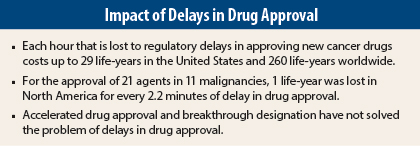Researchers have determined just how many lives are lost when effective investigational drugs are not approved in a timely manner. These delays in the process of anticancer drug approvals result in thousands of premature deaths each year, according to an analysis presented at the 16th World Conference on Lung Cancer.1
David Stewart, MD, Head of Medical Oncology at the University of Ottawa/The Ottawa Hospital, Canada, looked at 21 drugs as illustrative examples. For these 21 drugs combined, there were 29 life-years lost in North America and 260 life-years lost worldwide per hour of delay in drug approval.
Dr. Stewart indicated that the current regulatory process for approving new drugs increases drug development costs and hinders drug approval. Despite relatively modest gains in survival afforded by new anticancer agents, delays in their approval still result in many life-years lost, he said.
Worldwide, steadily increasing regulatory complexity has driven up the cost of drug development much faster than the rate of inflation, and this contributes directly to high health-care costs. There has been a minimal demonstrable impact on clinical trials safety, and the slowed progress leads to increased suffering and premature death, according to Dr. Stewart.
“There would be a large negative impact associated with approval delays, even if factors such as comorbidities, performance status, and ability to pay limit the number of patients treated to a fraction of the total dying from a specific malignancy,” he said.
Accelerated approval and breakthrough drug designation have not solved the problem. These changes may have cut the time to drug approval substantially, but predominantly they have just removed the requirement for phase III trials, Dr. Stewart pointed out.
“They have not fixed the escalating burden of clinical research bureaucracy,” he said, adding that although there may be a “shorter distance to the goal posts, the mud on the way to these closer goal posts keeps getting deeper.” Dr. Stewart commented, “We need to fix this problem.”
Assessing Life-Years Lost
Between 2001 and 2015, Dr. Stewart and colleagues assessed drugs shown in phase III trials to significantly improve overall survival, excluding adjuvant trials and trials in rare malignancies. They then multiplied the improvements in median survival (years) by the estimated number of patients who died annually from the malignancy in both North America and worldwide.
Dr. Stewart presented data on the approval for 21 agents in 11 malignancies. For all drugs and tumor sites combined, 1 life-year was lost in North America for every 2.2 minutes of delay in drug approval. Worldwide, 1 life-year was lost for every 12 seconds of delay.
He broke the analysis down for individual drugs and demonstrated that cumulatively, to achieve drug approval, more than 250,000 life-years are lost per year in North America.
Their calculations did not take into account the impact of drugs that were considered nonevaluable due to crossover or missing survival data, drugs that were prematurely abandoned, and drugs still under investigation.
By emphasizing that these lives are “unnecessarily lost,” Dr. Stewart concluded, “even if only 1% to 10% of patients had drug access, the losses are still enormous.”
Accelerated drug approval and breakthrough designation are helpful, “but we must do much more,” he maintained. “We all share the blame,” including investigators, research staff, institutions, internal review boards, sponsors, clinical research organizations, regulators, the tort system, and the press. “We all share responsibility, therefore, to solve this,” stated Dr. Stewart. “It’s time to act.” ■
Disclosure: Dr. Stewart is a consultant and on the advisory boards of Roche Canada, Pfizer Canada, Boehringer Ingelheim Canada, Amgen, Amgen Canada, and Novartis Canada; receives clinical trial support from Boehringer Ingelheim, AstraZeneca, Novartis, Bristol-Myers Squibb, and Celgene; and scientific writing support from Boehring Ingelheim.
Reference
1. Stewart DJ, Stewart AA, Wheatley-Price P, et al: Impact of time to drug approval on potential years of life lost: The compelling need for improved trial and regulatory efficiency. 16th World Conference on Lung Cancer. Abstract ORAL12.05. Presented September 7, 2015.



